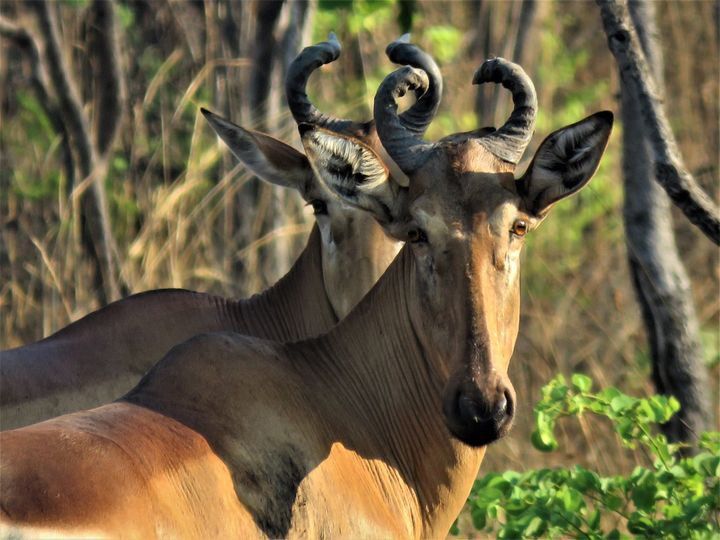THE NATURE OF THE BEAST

Lichtenstein's hartebeest, kongoni in Swahili. A characteristic miombo antelope, with a uniquely odd appearance and heart-shaped horns. I find them inexplicably quite appealing, and am particularly fond of this photo I captured of two of them one fine morning in Piti Game Reserve, in Tanzania.
But, besides me, who else values them?
Do tourists book photo safaris in the hopes of seeing them? No. Many tourists don't even know what they are. Do professional photographers hope to earn fame and money from shooting the ultimate photo of them? No. They're not considered iconic or photogenic enough, unless they're featured in a scene as prey being attacked or consumed by a charismatic predator. Do pastoralists welcome their presence? No, as they are selective grazers who compete with domestic livestock for precious grass and water resources. Do rural dwellers value them? Yes, as a meat source. But, as such, they are usually killed illegally, in indiscriminate, unregulated, unsustainable manners. And not only for subsistence but for the commercial bushmeat trade, wherein none of the profits contribute to wildlife conservation. Poached, which actually costs conservation funders to combat instead.
Who, then, uniquely gives value to the Lichtenstein's hartebeest, in regulated ways that generate legitimate revenue for the Tanzania government and its residents by sustainably utilizing these unique animals as a renewable, valuable natural resource, part of an effective conservation model that benefits all of nature? Hunting outfitters and their clients do. Although hunters typically don't travel specifically to solely hunt Lichtenstein's hartebeests, pursuing them in their native habitats, in remote wilderness areas, is definitely part of the allure of a classic hunting safari in Tanzania.
Hartebeest are highly territorial antelopes. Only approximately a third of the adult males will ever likely hold a territory, and their tenure as breeders is typically brief - less than a year. This inherent surplus of males and high turnover of sires allows the males to be very sustainably hunted under proper quota systems and trophy hunting regulations also forbid the hunting of any females or young.
Hartebeest and other plains game species may not be the premier animals pursued in hunting safaris, but their inclusion in the funding model gives them value that adds to the protection of vast, intact ecosystems that are not only critical for biodiversity, but also for the ecological integrity of landscapes, additionally benefiting adjacent human populations as well, in collateral ways.
But anti-hunters and animal rights activists, via their campaigns to ban either hunting tourism and/or trophy imports, seek to eliminate the one regulated, sustainable use of this animal that can and does contribute positively to not only its own conservation but to every other species of flora and fauna in its habitats.
Regardless of how one feels about hunting, this persecution is difficult for me to understand. The only way it makes sense is if those who wish to render legal hunting programs inviable feel that their emotions and preferences are more important than actual conservation needs. Removing necessary funding sources has high associated costs. And who ultimately pays? The wildlife does. Only wildlife unequivocally needs wildlands. Humans can fend on and often even prefer converted, highly altered landscapes. But nature cannot fully exist in such settings.
People who don't share my intrinsic appreciation of hartebeest often describe them as looking foolish, but I beg to differ. Appearances are very deceiving. They are actually very keen, clever, sharp-sighted beasts whose value to the retention of irreplaceable vastnesses of truly wild country should be acknowledged. They are every bit as important as the better known, more beloved species. Underappreciated and even sometimes ridiculed, hartebeest are not the fools. The people who refuse to see the necessity of giving such animals legitimate value, which in turn allows their required habitats to compete against alternative land uses, are worthy of that moniker instead, and remind me of the following quote.
"For there is no folly of the beast of the earth which is not infinitely outdone by the madness of men." - Herman Melville
Madness should never prevail over pragmatism and reality, particularly not if you truly do wish to see nature persist.

